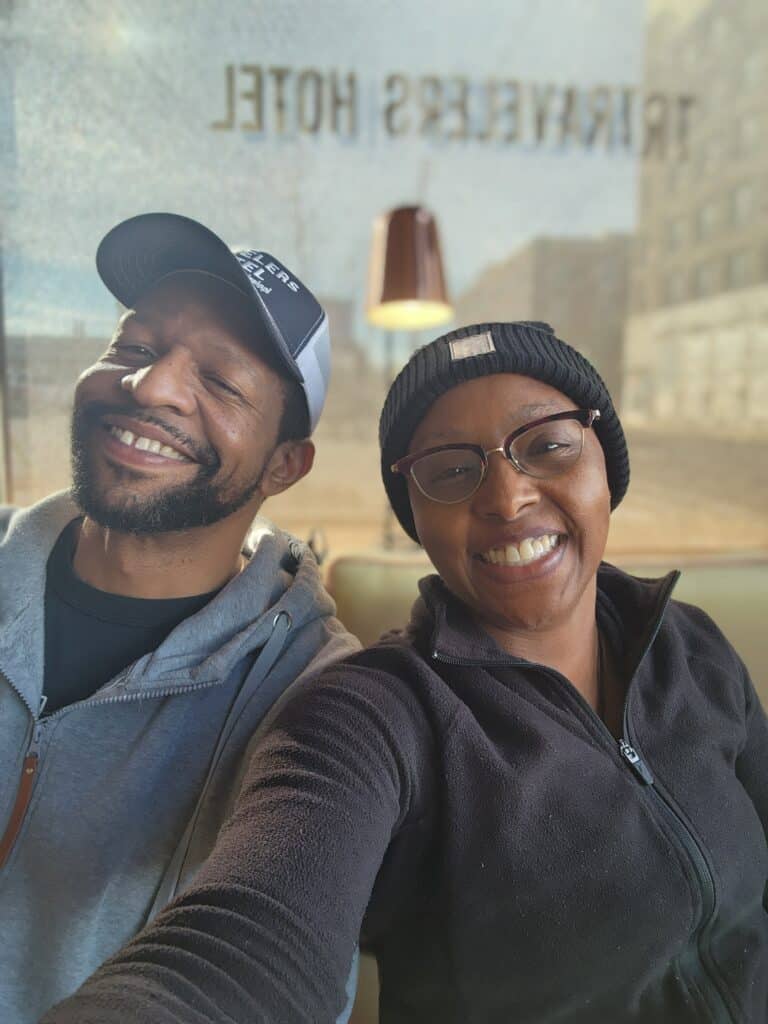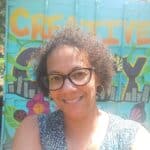Why Do You Stay?
Home »

“Why do you stay here?” is perhaps one of the most offensive questions you can ask someone about their hometown. This is especially true if their hometown has a complicated reputation. On one hand, Clarksdale, Mississippi, is the birthplace of the blues. On the other hand, like other towns in the Mississippi Delta, Clarksdale is known for its poverty. Additionally, its present day culture and reputation grapple with our country’s past racial sins, but Mississippi’s reputation for being a special kind of hell for African Americans still looms large. Although I knew this question was loaded and could potentially be received as insulting, I posed it to Thaxton Abshaloam Waters, who is a 40-something, divorced father of two. Our conversation lasted for more than two hours.
Thaxton works as the artist in residence at Travelers Hotel in Clarksdale, Mississippi, and is simultaneously working on a masters degree in fine art. The artist in residence program requires artists to work about 24 hours each week and to use their artwork to create a gallery for Travelers in exchange for a stipend and free room and board. Prior to becoming the artist in residence at Travelers, he owned an art gallery in Nashville, TN, near the campuses of Fisk University, Meharry Medical College, and Tennessee State University. All of the art in this video is either his work or work that he owns.
My conversation with Thaxton covered a tremendous gamut. We talked about everything and in a manner that would have suggested to onlookers that we were good friends from way back when. I mean, I even told him that I can always spot a divorced man and compared divorced men to broken colts. Ex-wives, especially the first one, break them in and often make them less selfish and better communicators (I got nothing once we’re on wife number three and up)!
You might ask, “How do you get to this kind of personal exchange with a virtual stranger?” My potentially insulting question took us from superficial to genuine conversation from the get go. He shared that he’s staying because he is scouting opportunities to build wealth and financial stability for his family. He believes the reverse migration of Black people to the south will continue. Then, Thaxton flipped the script to ask about those of us who live in or near large cities: why do you stay? He asserted, “With increasing class disparity, diminishing wages in our country, and the high cost of housing, city living is unsustainable unless you plan to work all the time. Even then, it still might be hard to make it.” He even wondered aloud if there is something inherent about city living that is destroying our families and communities and Black men, in particular.
As I considered his response, I thought about Isabelle Wilkerson’s book, “The Warmth of Other Suns” wherein she talked about how southern rural Blacks who migrated had different values than their northern skinfolks. Her research showed that the “migrants” earned less money, but worked harder and eventually had greater net worth than their northern counterparts. Moreover, her research suggested the Black migrants were the cream of the crop of the families and communities they left. But the longer they stayed, the more they became a part of the north. The values that served them so well were tested and changed as they raised their families. Given that Mississippi seemed to be one of the most religious places I’ve ever visited, I wondered, “Aside from the power and influence of the Black Church, what else have we lost?” Thaxton and I even talked about a comment that Harry Belafonte shared about a conversation he had with Dr. King several days before he was assassinated, “Did we integrate into a burning house?”
As we went from exploring the social dilemma of urban living, I thought about my volunteer work as an eviction diversion mediator during the pandemic lockdown and what we know as a nation: affordable housing in Philadelphia and New York City Metropolitan Area is like affordable housing around the rest of the country: increasingly hard to find and increasingly unaffordable!
There were so many people who were so behind on their rent that I still wonder if the payment arrangements that I helped to broker are likely to be met. One woman and her partner were thousands of dollars in arrears because she had a difficult pregnancy and was on bed rest; thus, she couldn’t work. They avoided homelessness by moving in with her family; however, they could only afford to commit to $200 a month to pay more than $16,000 in back rent because simply being alive meant they were accruing more expenses.
My conversation with Thaxton was perplexing: how do we create economic opportunity for people in both rural and urban areas? Even though the cost of living in rural areas is lower, finding employment that pays a living wage is still hard. As I drove away from Clarksdale, I saw very few places that I thought offered well paying jobs. With all due respect, can you make it on the salary you earn at Sonic and Dollar General? How many hours do you wind up working there? How many jobs do you actually need to pull that off? I wonder what these realities look like through the statistical lens of race (I, too, am a daughter of the south, and I see color…all the time).
My next two podcast interviews with Dr. Pam “Boss Lady” Chatman and Keith Johnson will speak to the challenges of trying to make it in the Delta. Dr. Chatman will share how she manages a program that buses people from the Delta to Memphis to work. Some people commute 2 – 3 hours each way in search of a decent job! On the other hand, Keith Johnson will share how he is making life and money work so that he, too, can create wealth and stability for his family!





